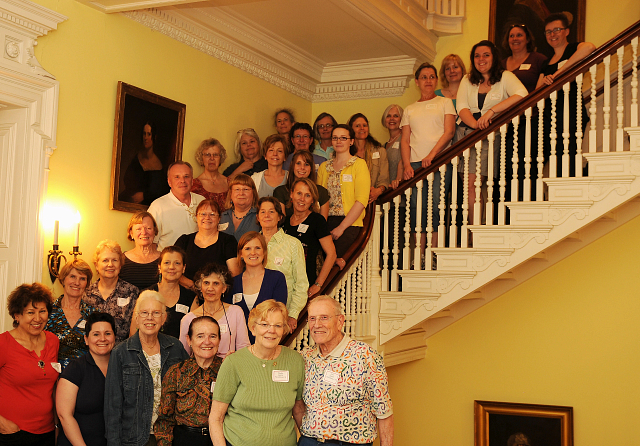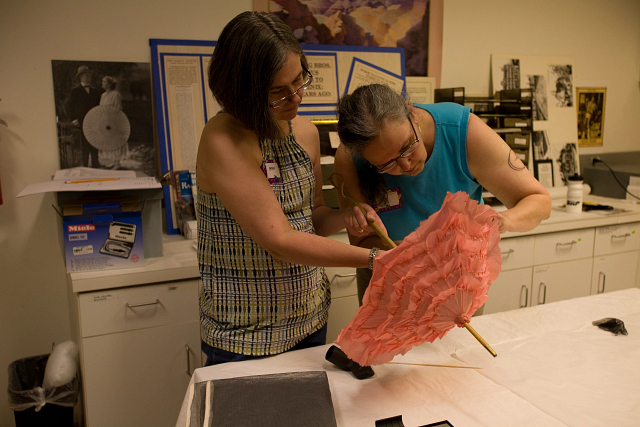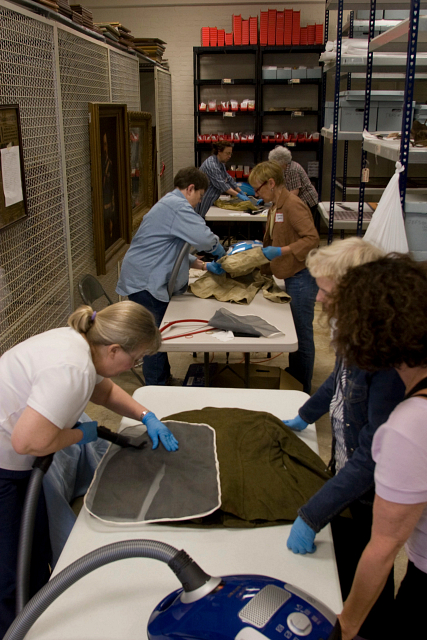
Anyone who works at a collecting institution can attest that textile collections, especially clothing collections, can be uniquely difficult to manage properly. Clothing presents different challenges than paper, books and even other three-dimensional collections. Conversely, textiles and clothing can make up some of the most interesting and historically significant parts of collections. The Costume Society of America (CSA) recognizes the challenges and rewards inherent in costume collections. Members of the CSA are experts in costumes, dress and appearance. That expertise covers all subjects related to costumes, including the history of clothing, research, designs, preservation and even the cultural and psychological impacts of dress and clothing.
Gaylord Archival spoke with Martha Winslow Grimm, a costume conservator with the CSA and co-coordinator of their Angels Project, about how the CSA helps small institutions care for their costume collections. The Angels Project is a volunteer day held in conjunction with the CSA’s National Annual Meeting and Symposium to provide conservation, storage and curatorial assistance to a small institution. This event brings together CSA volunteers from all over the country to help an institution improve how they care for and store their textile collections. Vendors, including Gaylord Archival, donate supplies to help their efforts.

CSA volunteers work with the institution to determine its needs. Although each location has its own unique challenges, Ms. Grimm says the most common need is better storage for their textile collections. The volunteers work with the institution to mechanically clean all the artifacts carefully using a vacuum. They photograph and document the items, working with the institution to ensure the items are correctly identified. Since the CSA has experts in certain types of textiles and each institution knows the history of their collections best, this collaboration allows for better overall understanding of the artifacts. The volunteers also label the artifacts using the system already in place at the institution, and then rehouse everything. The group can process 250 to 300 artifacts in an event, completely transforming the institution’s textile collection storage, organization and preservation.
The event is a learning experience for everyone involved, and Ms. Grimm explains that education is an important part of their process. CSA volunteers learn from each other, and many participate to gain hands-on experience working with the artifacts and other costume experts. The staff and volunteers at the hosting institution learn more about proper handling, cleaning and storage while working with the Angels volunteers and are better prepared to work with their collections after the volunteers leave.
Ms. Grimm recalls one of their most interesting projects was working with the Jackson Barracks Military Museum in New Orleans after Hurricanes Katrina and Rita. Floodwaters damaged huge portions of the collections and the curator had picked artifacts out of the mud and cleaned them with a garden hose until they could get proper attention. The CSA Angels began mechanical cleaning of the artifacts, started a re-documentation project and helped kick-start the long process of disaster recovery. The museum has since dedicated a new building.
Museums that wish to improve their textile storage and care without an Angels visit can benefit from some advice from Ms. Grimm. Making sure the storage space is climate controlled and that storage materials are safe is extremely important, but her biggest recommendation is the purchase of a canister vacuum with adjustable suction control. An institution that has the knowledge and ability to mechanically clean their collections can prevent serious damage from contaminants and can help prevent pests and vermin from destroying artifacts.

Last year, the Angels Project worked with the Historical Society of Baltimore County in Cockeysville, Maryland. This year, they will be traveling to Texas for their Annual Meeting in San Antonio, and the Angels Project will be helping the Heritage Museum in Seguin. Next year, the Angels Project will be in the vicinity of Cleveland, Ohio and the leadership is looking for a small museum or historic house for the 2016 CSA Angels Project. In addition to the Angels Project, the CSA also provides two annual Small Museum Collection Care Grants to assist with costume and textile collections at institutions with small budgets and staff.
Learn more about the Angels Project >
Learn more about the Costume Society of America, including grant opportunities >



